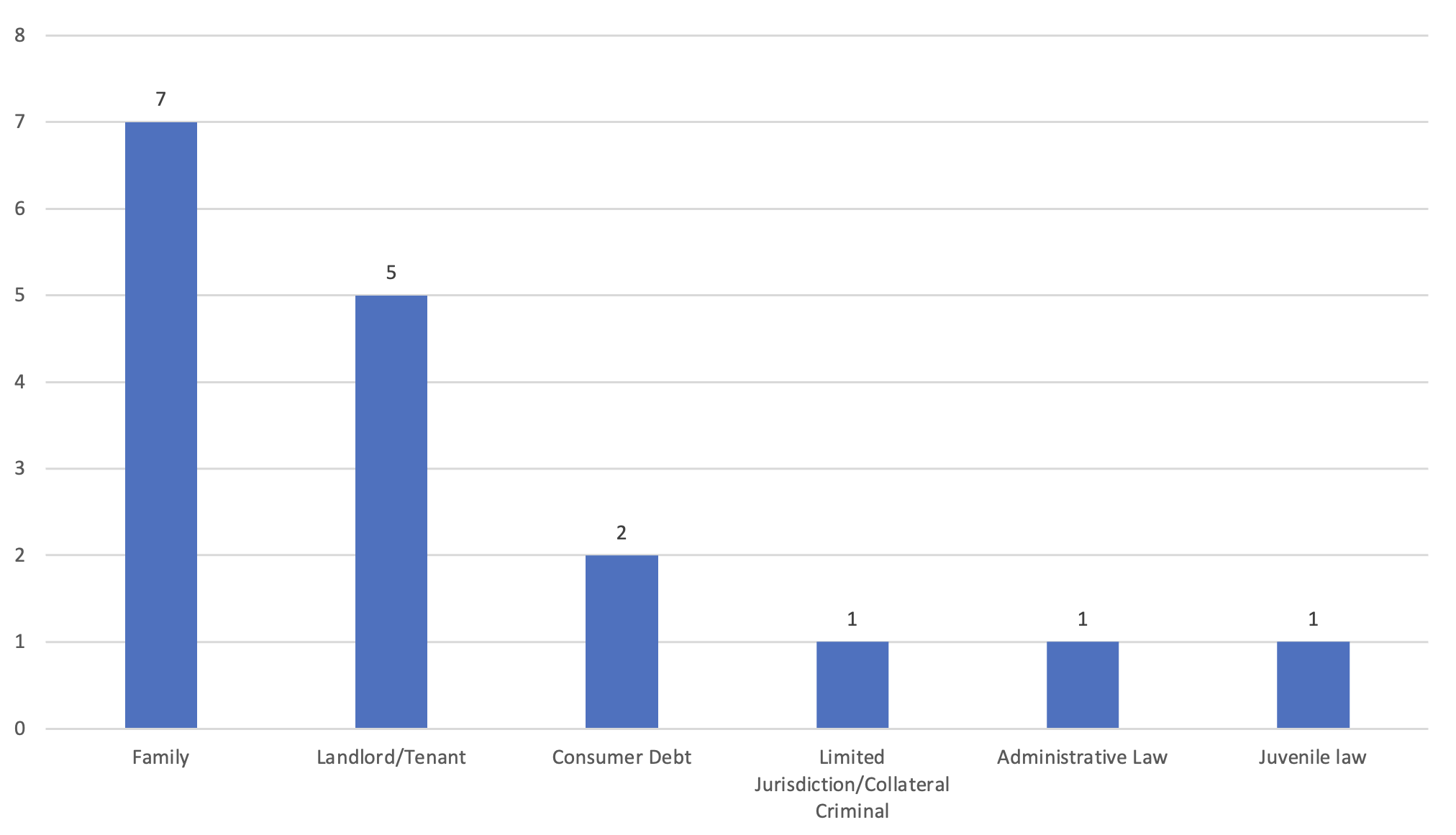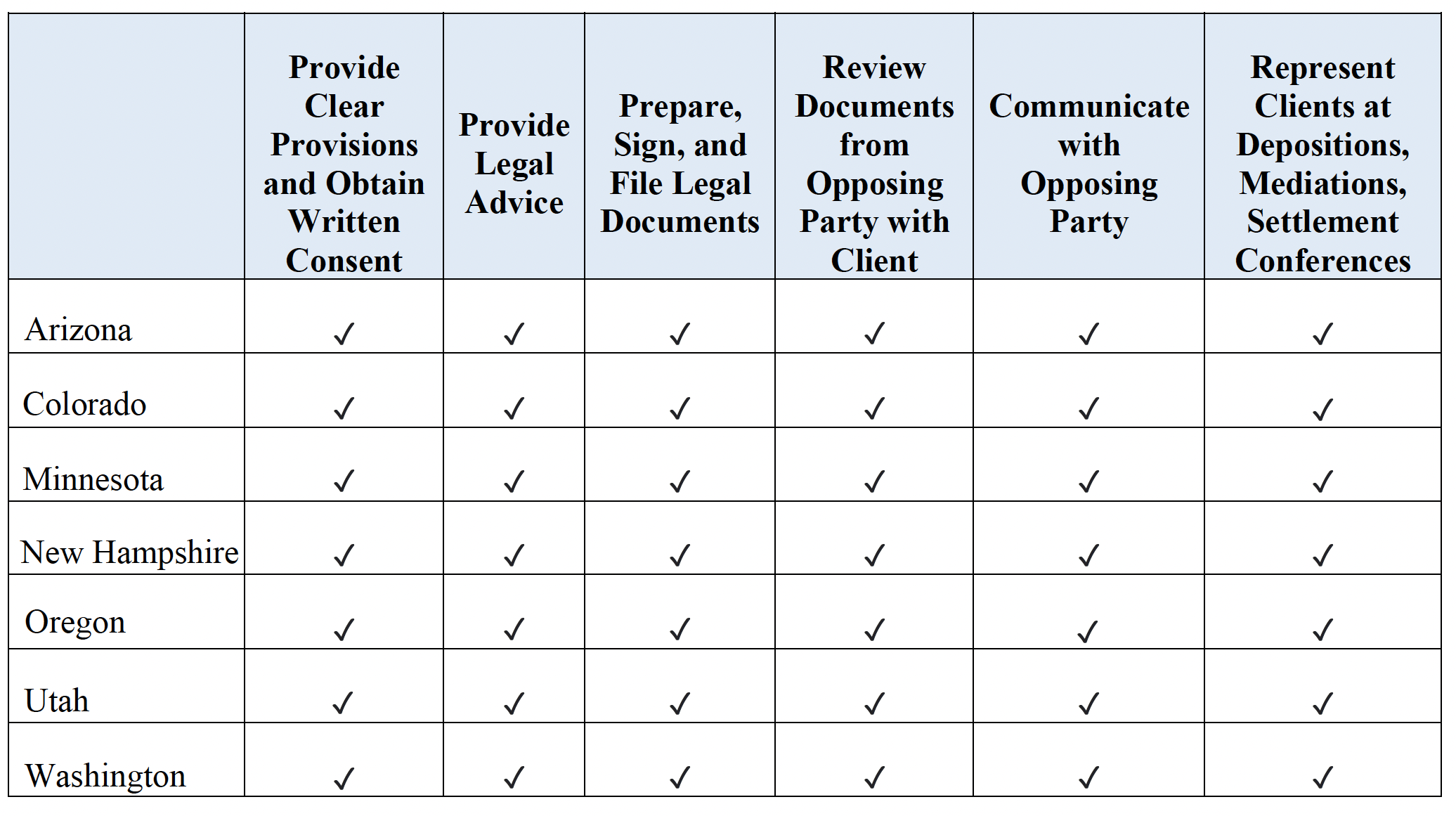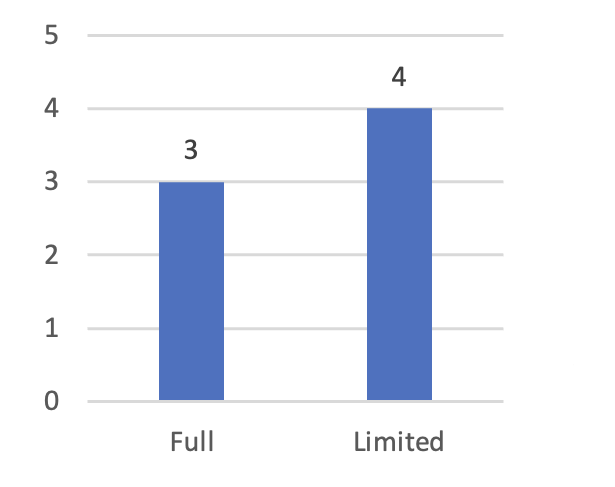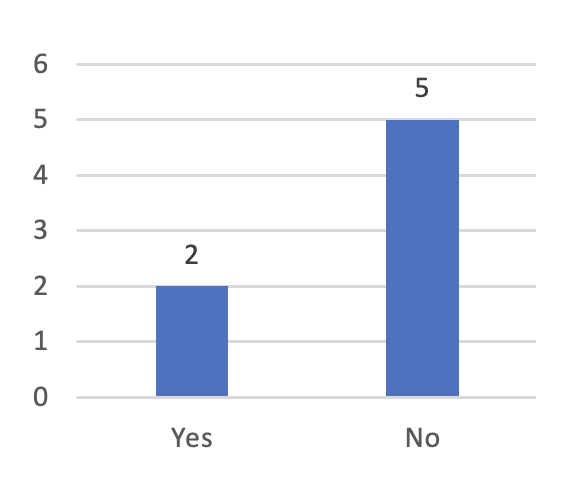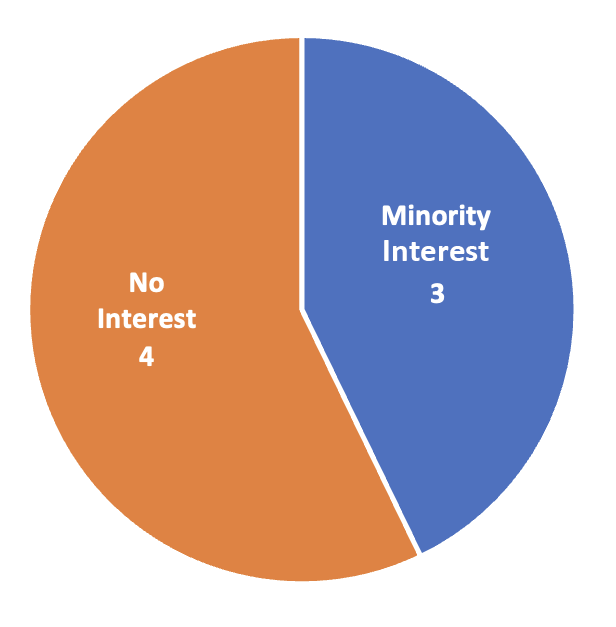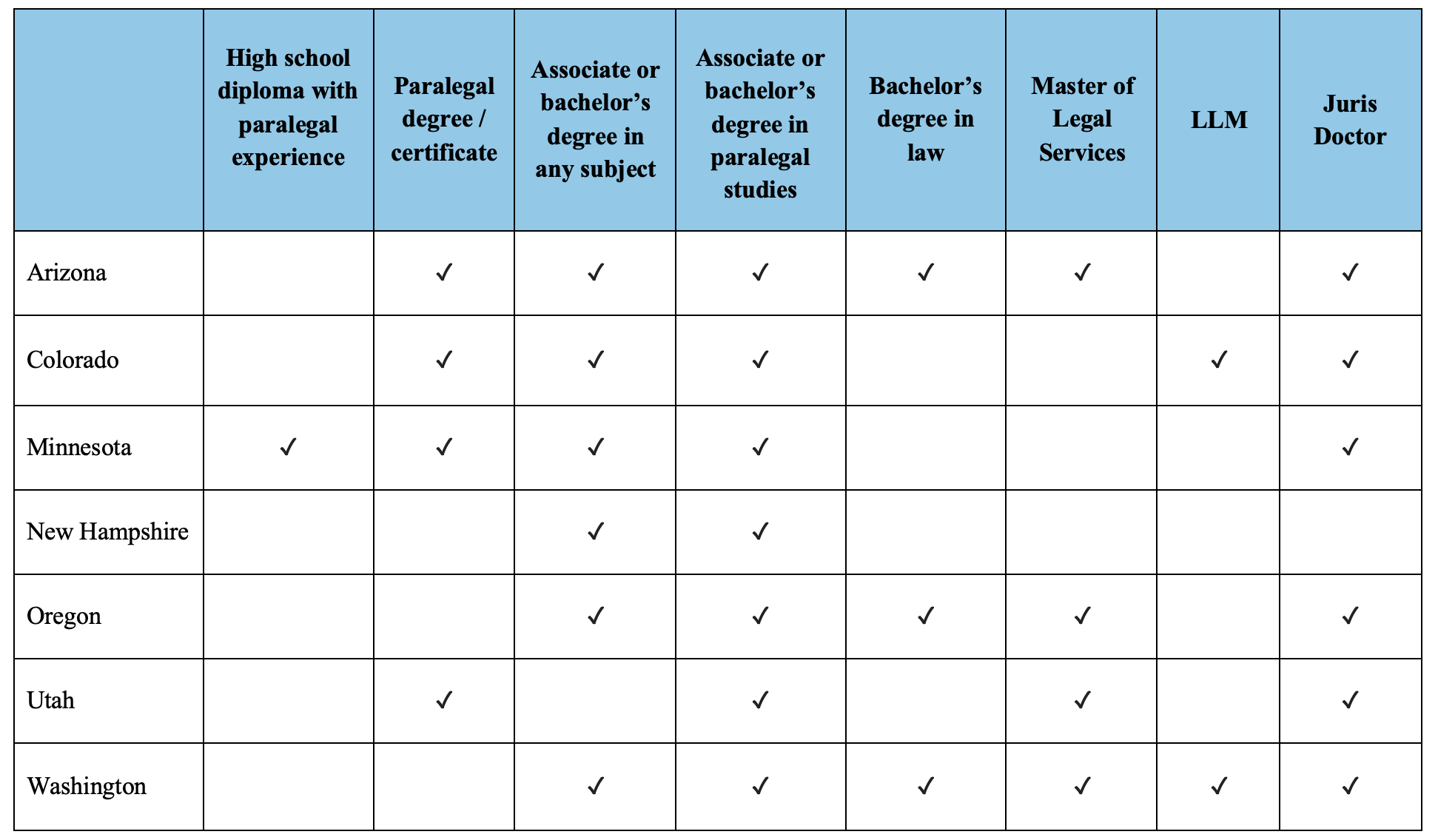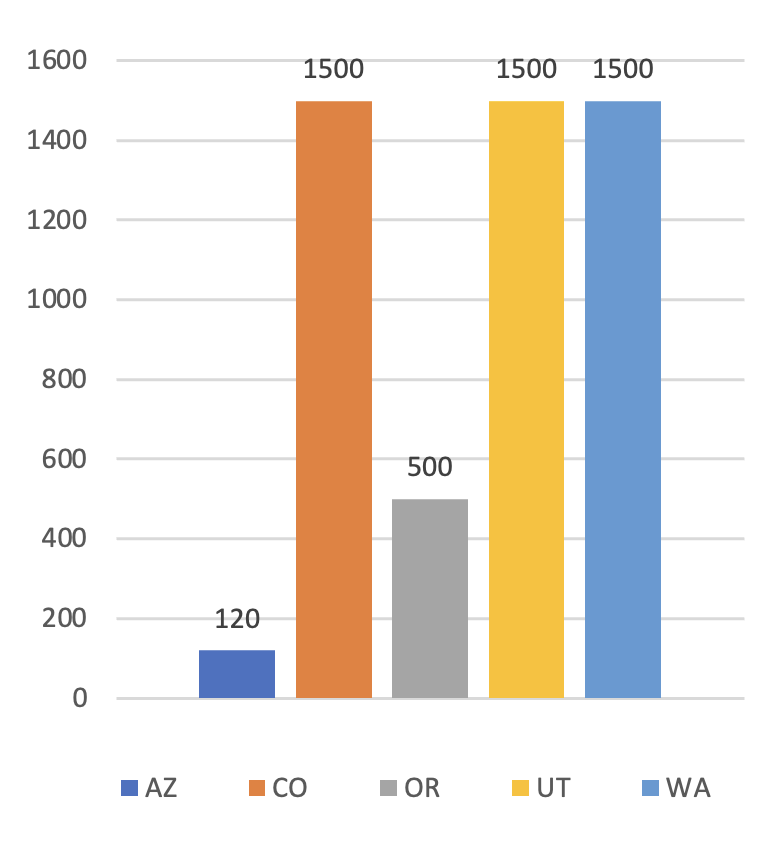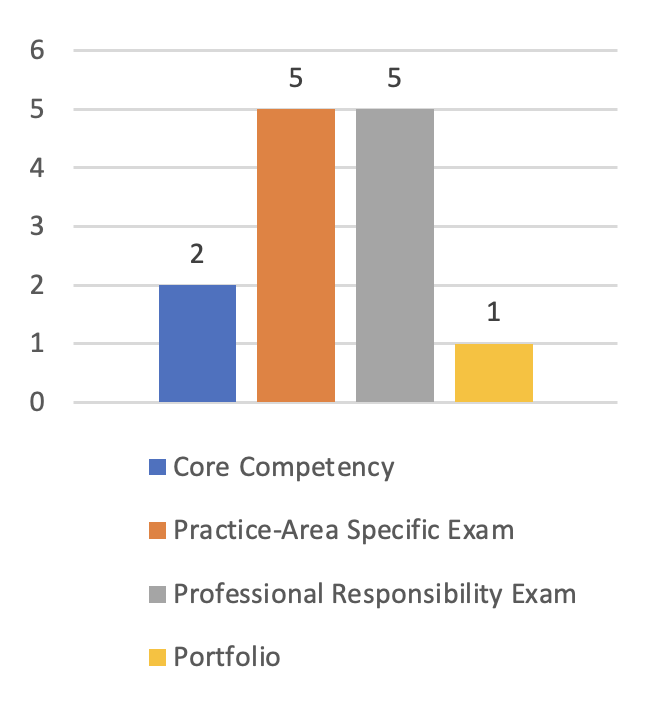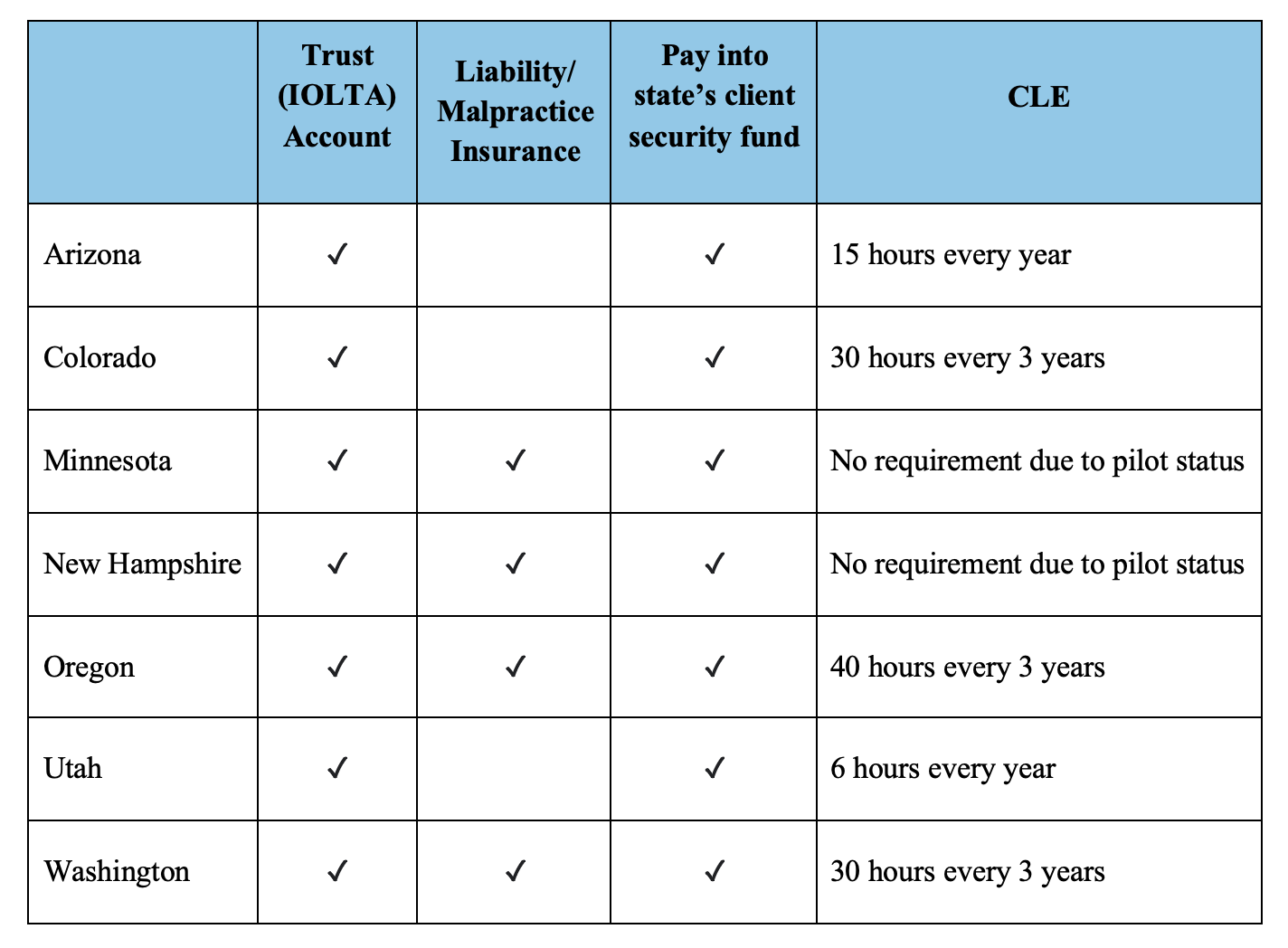< Back to Allied Legal Professionals
IAALS’ Allied Legal Professionals Knowledge Center captures the ongoing work and developments by states around the country exploring the expansion of legal services through new tiers of legal professionals. This Knowledge Center is an up-to-date resource with current state information and recommendations for those considering how these programs can be achieved and improved; read our National Framework for Program Growth for guidance on considering, implementing, or refining ALP programs. Explore the map for state-by-state updates, and the tables and figures below for analysis of program features.
For more information about other regulatory models for nonlawyer legal service providers, visit our Unlocking Legal Regulation Knowledge Center.
Results
Overview:
Status: Implemented
Number of ALPs: 35
Areas of Law: Family, Landlord/Tenant, Debt, Petty Misdemeanor, Probate, Estate, Public Benefits, Unemployment
In 2014, the Minnesota State Bar Association’s (MSBA) Task Force on the Future of Legal Education examined ways of making legal careers more affordable while also addressing the existing unmet need for legal representation. One of their recommendations was to create a separate task force focused on studying the LLLT program. The MSBA then created the Alternative Legal Models Task Force with the charge of “examin[ing] the advisability of supplementing traditional lawyer representation through the creation of a new type of limited-scope certified legal assistance provider to increase access to justice for those who cannot afford a lawyer.” In 2017, the Alternative Legal Models Task Force submitted its report and recommendations to the MSBA that included the recommendation to create legal practitioners, based on the British Columbia model of paralegals.
In 2019, the Minnesota Supreme Court issued an order establishing the Implementation Committee for Proposed Legal Paraprofessional Pilot Project with the charge to expand the task force’s recommendations and develop a pilot project that would allow legal paraprofessionals (LPs) to provide legal advice under the supervision of an attorney. The implementation committee submitted its March 2020 report and recommendations to the Minnesota Supreme Court, recommending the framework for the LP pilot project. In September 2020, the Minnesota Supreme Court ordered that the LP pilot project be implemented starting in March 2021, with LPs able to practice in the areas of family law and landlord-tenant disputes.
The pilot project was originally set to end on March 31, 2024. On January 12, 2024, the Standing Committee filed its Final Report and Recommendations with the Minnesota Supreme Court. On September 16, 2024, the Minnesota Supreme Court issued an order making the LP program a permanent judicial branch program. The court also expanded the program to allow LPs to:
- Practice in Housing Court in the Fourth District.
- Appear in court and provide legal advice regarding criminal expungements.
- Offer advice and representation in cases involving consumer debt or student loan debt where the disputed amount is $15,000 or less.
- Practice in petty misdemeanor cases if they meet specific Certified Legal Paraprofessional requirements.
- Provide advice and appear in court or judicial/administrative proceedings on behalf of clients in certain probate and estate administration cases.
- Provide advice and representation in certain proceedings before the Office of Administrative Hearings.
- Represent individuals challenging denial of unemployment benefits before the Department of Employment and Economic Development.
- Represent individuals challenging the denial of benefits administered by the Minnesota Department of Human Services.
This expansion significantly broadens the scope of practice for LPs, enhancing access to justice in the state.
About the Program:
Reports, Recommendations, and Letters:
- Alternative Legal Models Task Force Report and Recommendations (2017): https://msbawebtest.mnbar.org/docs/default-source/policy/alm-task-force-report-and-recommendations-final.pdf?sfvrsn=3c0f1d10_0
- Implementation Committee Report and Recommendations to the Minnesota Supreme Court (March 2020): https://static1.squarespace.com/static/5e3ad81df16b3b261f358798/t/5f3ee98c960c20305f9e7111/1597958553059/Report-and-Recommendations-to-Minnesota-Supreme-Court-reduced-size.pdf
- Minnesota Supreme Court Order to Implement the Program (September 2020): https://www.mncourts.gov/mncourtsgov/media/Appellate/Supreme%20Court/RecentRulesOrders/Administrative-Order-Implementing-Legal-Paraprofessional-Pilot-Project.pdf
- Interim Report and Recommendations to the Minnesota Supreme Court (December 2021): https://www.mncourts.gov/mncourtsgov/media/Appellate/Supreme%20Court/Administrative-Interim-Report-and-Recommendations-from-the-Standing-Committee-for-LPPP.pdf
- Minnesota Supreme Court Order Establishing Public Hearing and Promulgating Amendments to Rules Governing Legal Paraprofessional Pilot Project (April 2022): https://www.mncourts.gov/mncourtsgov/media/Appellate/Supreme%20Court/Administrative-Order-Establishing-Public-Hearing-and-Promulgating-Amendments-to-Rules-Governing-LPPP.pdf
- Interim Report and Recommendations to the Minnesota Supreme Court (March 2023): https://mncourts.gov/mncourtsgov/media/Appellate/Supreme%20Court/Administrative-Standing-Committee-for-Legal-Paraprofessional-Pilot-Project-Interim-Report-and-Recommendations-to-the-Minnesota-Supreme-Court_Filed.pdf
- Final Report and Recommendations to the Minnesota Supreme Court (January 2024): https://mncourts.gov/mncourtsgov/media/Appellate/Supreme%20Court/LPPP-Final-Report-and-Recommendations.pdf
- Supreme Court Order Establishing a Permanent Legal Paraprofessional Program (September 2024): https://iaals.du.edu/sites/default/files/documents/publications/order_amending_rules_legal_paraprofessional_pilot_project.pdf
Statutes, Rules, and Regulations:
- None changed due to it being a pilot program
Education:
- Recommendation 2.2 (Page 11): https://static1.squarespace.com/static/5e3ad81df16b3b261f358798/t/5f3ee98c960c20305f9e7111/1597958553059/Report-and-Recommendations-to-Minnesota-Supreme-Court-reduced-size.pdf
LP Directory:
Additional Information:
- Standing Committee: https://mncourts.gov/lppp
IAALS Comments and Articles:
- IAALS Comment RE: the Expansion of the Legal Paraprofessional Pilot Project (February 2022): https://iaals.du.edu/sites/default/files/documents/publications/iaals_comment_expansion_mn_lppp.pdf
- Minnesota’s Legal Paraprofessional Pilot Project Shows Early Successes (March 2022): https://iaals.du.edu/blog/minnesotas-legal-paraprofessional-pilot-project-shows-early-successes
- Minnesota Supreme Court Builds Bridges with Regulatory Reform Opponents (June 2022): https://iaals.du.edu/blog/minnesota-supreme-court-builds-bridges-regulatory-reform-opponents

Nationwide Program Features:
Most states are limiting ALPs to these three areas of the law: family, landlord/tenant, and debt collection, with every state including family law. Only Arizona has broadened their scope beyond to include limited jurisdiction criminal law, administrative law, and juvenile law. Click for full size.
Each state allows/requires their ALPs to perform each of these roles to a certain extent. To ensure transparency, ALPs must inform their clients that they are not an attorney or that they are working with an attorney. With one exception, states with permanent programs allow ALPs to prepare, sign, and file pleadings while the one pilot state requires the supervising attorneys to sign all pleadings. While some states allow their ALPs to attend a client's deposition, no state allows ALPs to actively represent their clients at depositions. Click for full size.
Arizona, Minnesota, and New Hampshire permit their ALPs to provide full in-court representation, meaning they can represent their clients in court to the full extent an attorney can. While Minnesota and New Hampshire ALPs require attorney supervision, they can represent their clients in court without their supervising attorney present. The four remaining states limit the services their ALPs can provide in court, often limited to sitting next to their client, making opening and closing statements, advising their client as to arguments they should make and evidence they should admit, and answering questions from the judge. Click for full size.
The only two states that require attorney supervision of ALPs are those that began as pilot programs: Minnesota and New Hampshire. Minnesota has since transitioned to a permanent program, and it opted to keep the attorney supervision requirement. Click for full size.
Three states—Colorado, Utah, and Washington—allow ALPs to have an ownership interest in law firms. Their ownership must be a minority interest. The other four states currently do not allow their ALPs to have ownership interest in law firms. Click for full size.
Each state with a permanent program provides a variety of educational pathways to become an ALP, including a waiver of the educational requirement for those who have between three to ten years of substantive law-related experience, depending on the state. This list is only a sample of the most common educational pathways, not accounting for additional educational requirements some states require in addition to these degrees/certificates. Click for full size.
The majority of states require 1,500 hours of practical training prior to licensure of ALPs. In Arizona, the 120 hours is only for applicants that have a law-related degree, otherwise the applicant must also complete one year of substantive law-related experience. Each state requires a specific portion of these hours to be in the area of law the ALP will be licensed. Click for full size.
The format of examinations for Allied Legal Professionals varies by state with the use of multiple choice, essay, and issue spotting. They often resemble portions of the state’s bar exam. Oregon has set itself apart from the other states by implementing a portfolio requirement in addition to an examination. To fulfill this requirement, applicants must provide materials that include, at a minimum, a significant body of work in the area of law in which an applicant is seeking endorsement. Click for full size.
States that allow their ALPs to work independently of attorneys require them to adhere to similar regulatory requirements as attorneys, including the use of trust accounts and paying into the state's client security fund. Washington and Oregon require their ALPs to obtain malpractice insurance; similarly, Minnesota and New Hampshire—the two states that require attorney supervision—require the supervising attorneys to obtain malpractice insurance that also covers their ALPs. Click for full size.


